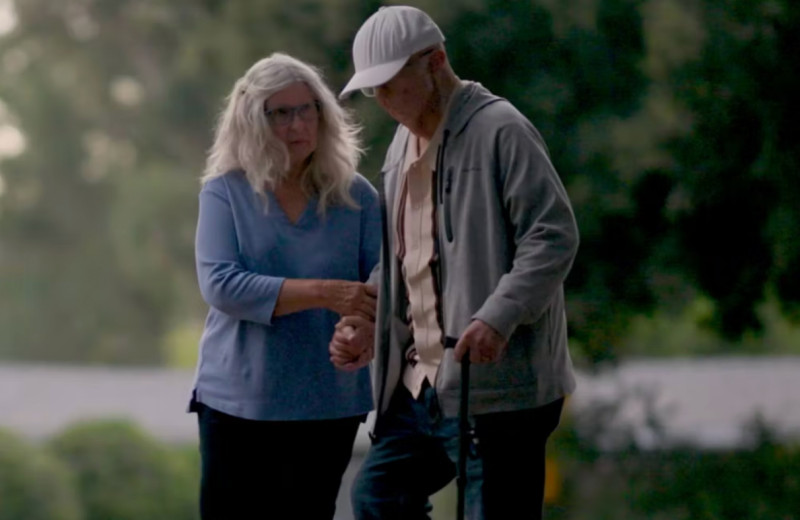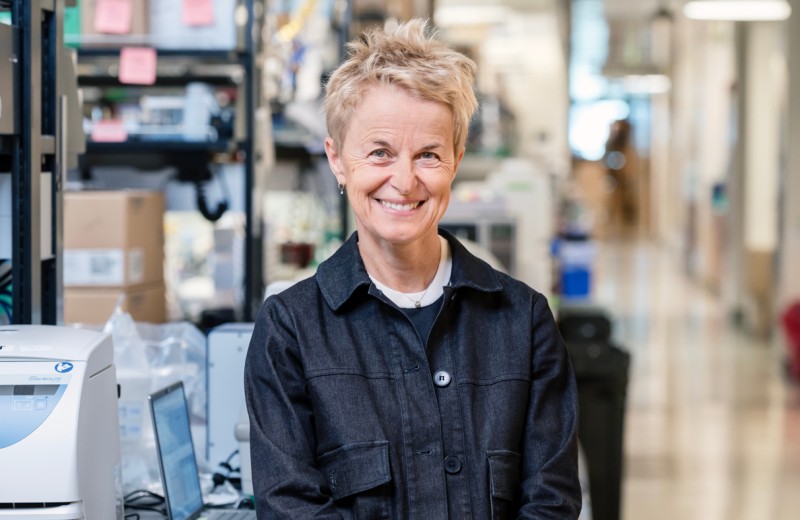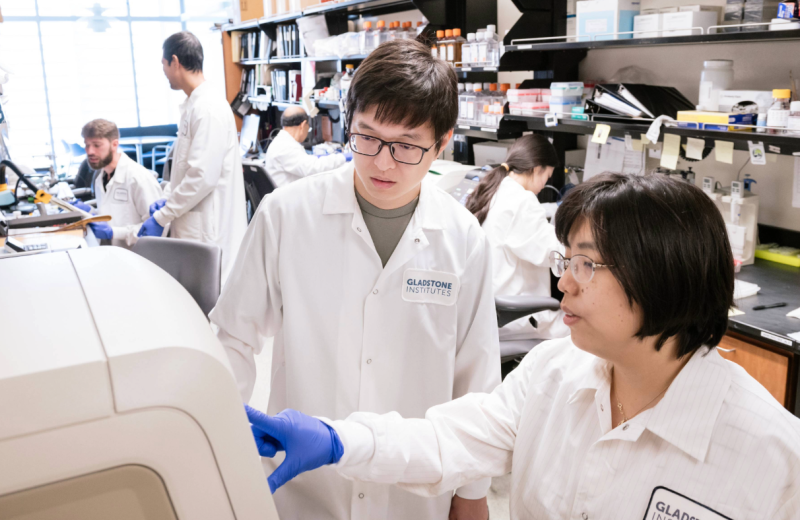Gladstone NOW: The Campaign Join Us on the Journey✕
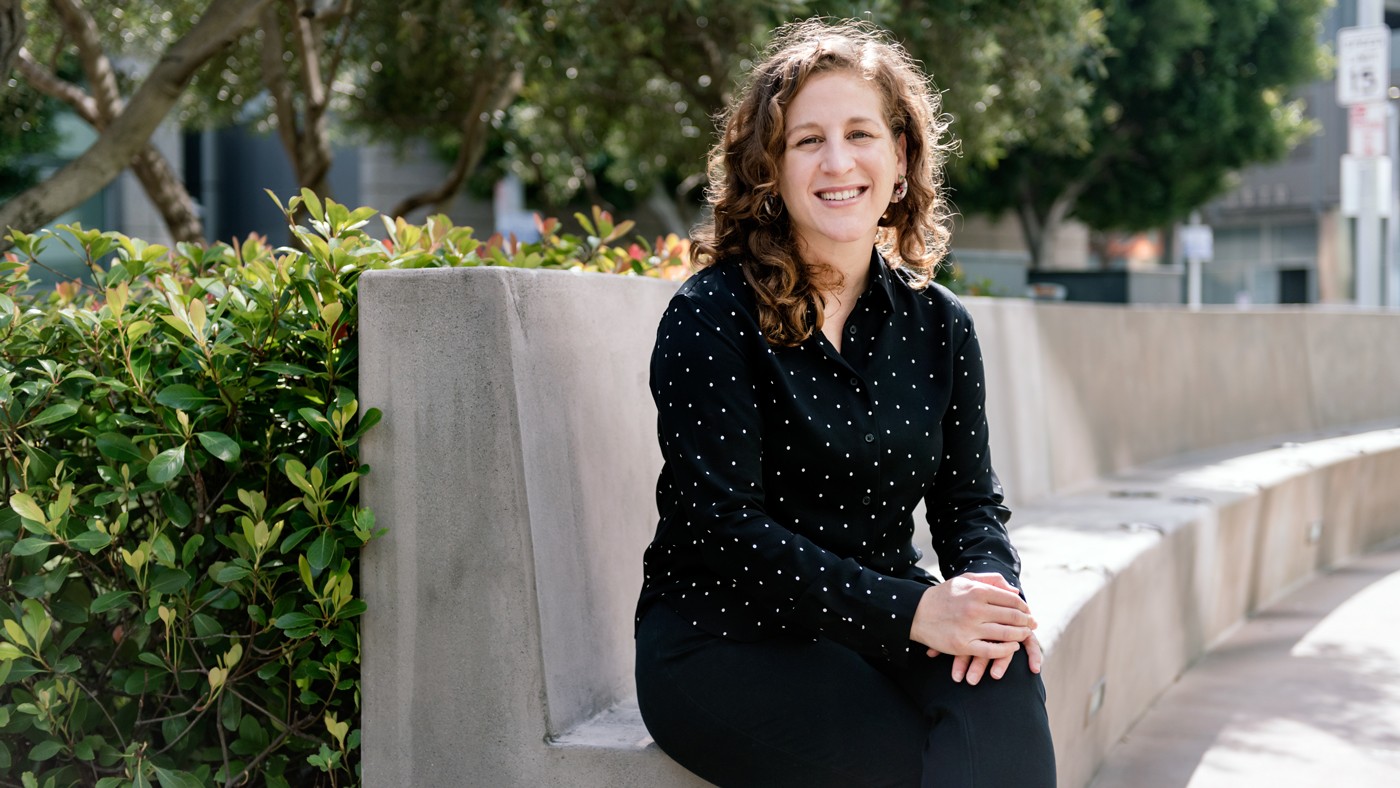
Jillian Goldstein, the new director of Gladstone’s Counseling and Wellness Center, answers questions about her work and the importance of in-house counseling in organizations
If the past 2 years have taught us anything, it’s the fact that anyone can experience stressors that impact their well-being—and that we all need to invest in self-care for the sake of our mental health.
To help Gladstonians focus on wellness, Jillian Goldstein (she/her) recently joined Gladstone Institutes as the first director of the Counseling and Wellness Center. In addition to reducing some of the barriers associated with accessing quality care (such as cost and time), she will provide customized support to the internal community by becoming intimately familiar with the unique needs, benefits, and challenges of our workplace.
Goldstein is a licensed clinical social worker who has been providing psychotherapy, facilitation, and coaching for professionals, parents, couples, and youth for over 15 years. Here, she answers questions about her work, discusses the importance of in-house counseling in organizations, and provides general tips to improve your well-being.
Why did you decide to become a psychotherapist?
After my undergrad in sociology and women and gender studies, I knew that I wanted to help people, but I was trying to decide between going to law school or becoming a psychotherapist. It was actually my grandmother who reflected back to me how I was empathetic and had a knack for connecting with people, and she recounted how I had helped my great-grandfather cope with the loss of my great-grandmother. I really took that to heart.
I ended up completing my Master’s in social work at Smith College. That experience gave me a solid foundation for how I want to be as a psychotherapist, and how I want to help people in a very holistic and comprehensive way.
It also helped provide a framework for centering more diverse voices (including women, people of color, members of the queer community) in my practice. This is important to me, not only as a mental health clinician, but as a queer woman married to an immigrant, and a mother to two bi-racial children. And it’s also why much of my work has focused on social and racial justice, diversity, and equity.
For the past 15 years, I’ve worked in group private practice, private practice, in-patient hospitals, outpatient clinics, schools, and most recently, I set up the first pediatric transgender program at Kaiser Permanente.
What brought you to Gladstone?
Being an in-house therapist for an organization is a dream job for me. I’ve always been fascinated by the intersection of employee engagement, morale, and mental health. Many of my clients in private practice worked in high-stress environments, and I just kept thinking, “Why don’t employers invest in employees’ wellness with an in-house therapist?”
So, I was incredibly surprised and excited when I saw this opportunity and knew I wanted to be part of a wellness initiative centering on employee mental health. And that’s how I landed here.
What do you like most about your work?
I love seeing the possibility for change. It’s very rewarding when I work with someone who may be experiencing difficult emotions, such as burnout, sadness, or anxiety, and then seeing their growth potential when they dedicate and invest in their psychological well-being. In our world, so many things are not within our control. With psychotherapy, people can experience a sense of agency or empowerment—and witnessing my clients’ transformation and growth is a privilege.
"We hope to bring our full selves to the workplace, and that comes with emotional and psychological complexities. So, to think that mental health doesn’t impact our quality of work is unhelpful and unrealistic."
As part of your role, you will be overseeing Gladstone’s new Counseling and Wellness Center. What types of services will you be providing to the Gladstone community?
Initially, I will be providing individual and couples counseling, as well as discussion support groups and workshops for topics that may interest the community, such as stress management, adjusting to life in the US, or self-compassion.
These are general themes I’ve been hearing so far that may be helpful, but I really want to get a sense of what Gladstonians want and need before I develop programming. For example, I can imagine providing training for teams around understanding how to identify mental health concerns, how to help someone with mental health issues, and self-care. I’m also hoping to bring in speakers to help raise awareness, break down stigma, and open up the conversation around mental health, specifically in science and academia, so people feel comfortable accessing care and know they’re not alone.
In addition, I will be connecting Gladstonians with services and resources provided outside Gladstone, based on specific needs, whether that means helping someone find the right therapist or community group. Many community resources are available and I’ll be happy to help people find the right fit.
A lot of stigma still surrounds mental health, and many people might feel judged if they seek help, especially in the workplace. What would you say to people who may be hesitant to reach out to you or take advantage of the services you offer?
People may get thrown off by the term “mental health,” but it’s important to remember that everyone struggles to some degree with emotional or psychological health wellness. A first step is to safely assume you are not alone, and it’s completely okay to seek help. Especially in a high-stress, high-achieving environment, people are going to feel pressure and stress.
Accessing counseling services doesn’t mean you need to have “capital D” depression or “capital A” anxiety. It’s common for people to minimize their emotional experience and prioritize other things, like work, spouses, or kids. I’m hoping that having an in-house counseling center at Gladstone will allow people to feel comfortable to talk to a trained professional and to know they’re not alone in needing additional support.
It’s also crucial to remember that confidentiality is a cornerstone of any therapeutic relationship, and that’s no different for a workplace counseling center. Participation will remain confidential and will not be disclosed to supervisors or People Services.
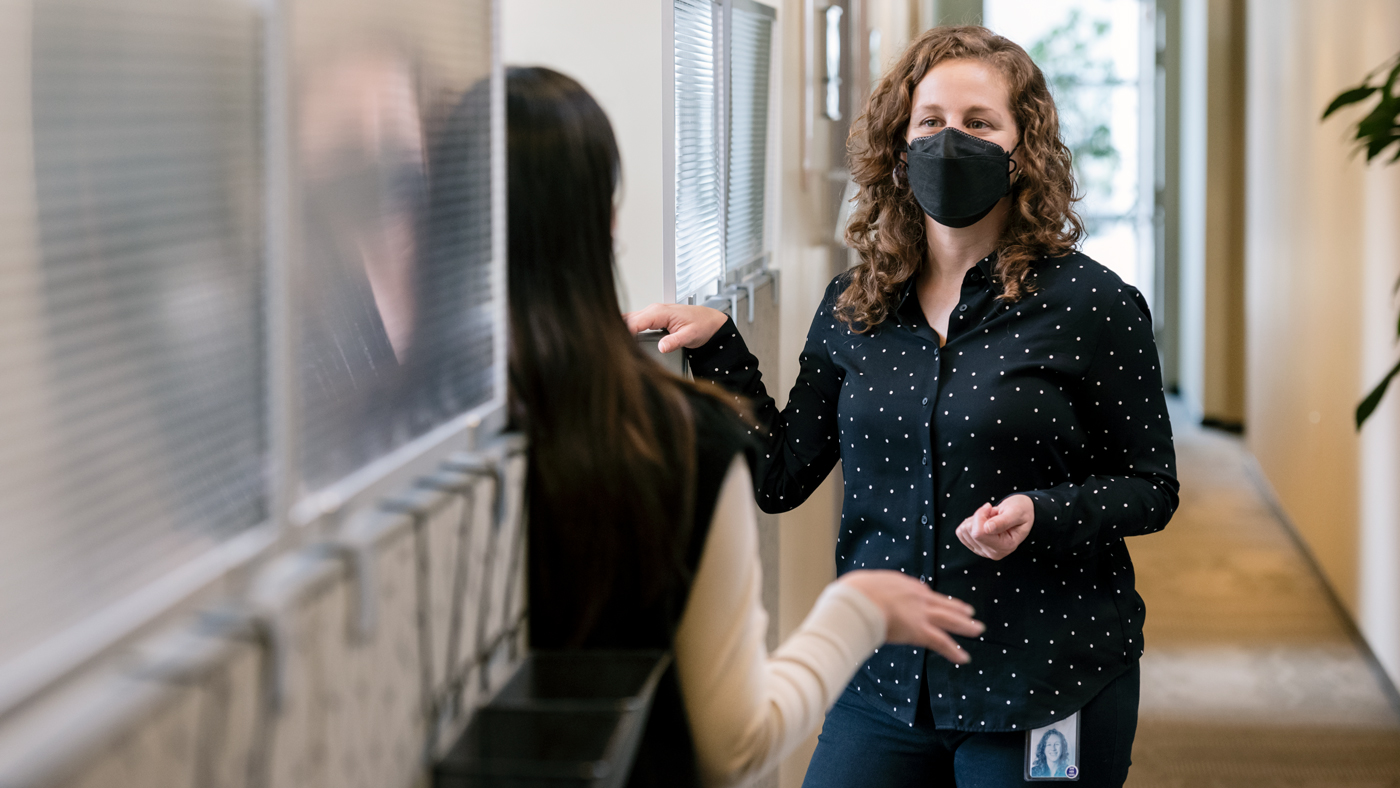
Goldstein uses a variety of techniques to provide a non-judgmental space for individuals and couples.
Why is it important for organizations to provide in-house counseling services?
We all have mental health issues. By that I mean that we all struggle in some capacity with something, whether that’s mild stress or figuring out a career move, or serious mental health concerns like depression, anxiety, or trauma history. We hope to bring our full selves to the workplace, and that comes with emotional and psychological complexities. So, to think that mental health doesn’t impact our quality of work is unhelpful and unrealistic.
Organizations ought to focus on how people feel engaged, fulfilled, and valued at work. By having a counseling center like this one, I think that demonstrates to the community that Gladstone invests in employees and wants to ensure their holistic wellness—at work and home.
What is your approach?
My approach as a therapist is warm, strengths-based, inclusive, and collaborative. I provide a welcoming and non-judgmental space to help my clients on their path of self-awareness, discovery, and wellness. My practice is influenced by a variety of approaches, or a toolbox of techniques that I tailor to individuals’ or couples’ needs and specific situations.
What general advice can you give people who want to be proactive about their mental health?
I think it’s really important to notice the quality of your thoughts; everyone has self-talk, the internal dialogue in your mind, and when people veer toward self-criticism, self-doubt, and general negativity, that will permeate throughout one’s wellness. It’s hard to maintain positive self-esteem, hope, and compassion when your thoughts are negative. Identifying ways to counteract negative self-talk and build resilience and self-compassion is very common in my practice with clients.
Additionally, incorporating small wellness habits in your daily life can help build and maintain positive mental health. Examples of tangible and action-oriented habits include ensuring you are getting enough sleep (between 7 to 9 hours ideally), maintaining connection with others, engaging in physical activity, and being intentional about what brings you joy. These can also be simple habits, such as taking 5 minutes in the morning to journal, texting a friend to connect, going for a walk during lunch, cooking a good meal, or listening to a mindfulness exercise before bed.
Want to Join the Team?
Our people are our most important asset. We offer a wide array of career opportunities both in our administrative offices and in our labs.
Explore CareersOne Person’s Final Gift to Science Gets Us Closer to an HIV Cure
One Person’s Final Gift to Science Gets Us Closer to an HIV Cure
A new documentary follows Jim Dunn’s end-of-life decision to donate his tissues to HIV research.
Institutional News HIV/AIDS Infectious Disease Roan LabBeyond Viruses: Expanding the Fight Against Infectious Diseases
Beyond Viruses: Expanding the Fight Against Infectious Diseases
The newly renamed Gladstone Infectious Disease Institute broadens its mission to address global health threats ranging from antibiotic resistance to infections that cause chronic diseases.
Institutional News News Release Cancer COVID-19 Hepatitis C HIV/AIDS Zika Virus Infectious DiseaseFueling Discovery at the Frontiers of Neuroscience: The NOMIS-Gladstone Fellowship Program
Fueling Discovery at the Frontiers of Neuroscience: The NOMIS-Gladstone Fellowship Program
The NOMIS-Gladstone Fellowship Program empowers early-career scientists to push the boundaries of neuroscience and unlock the brain’s deepest mysteries.
Institutional News Neurological Disease Mucke Lab NOMIS

